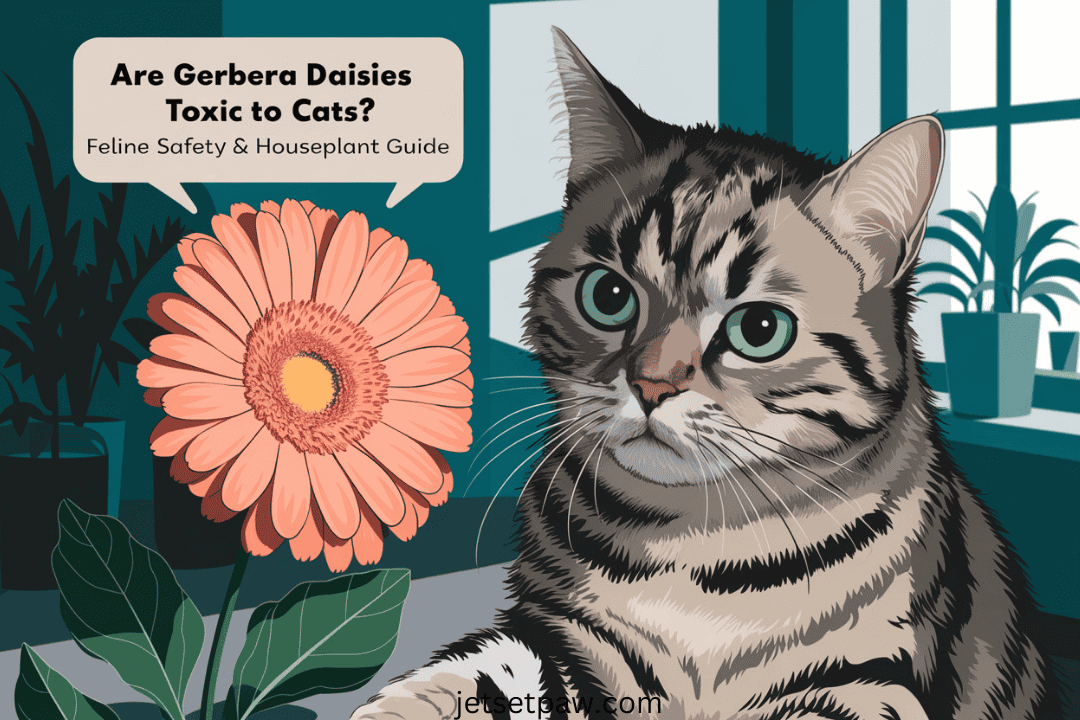Gerbera daisies are popular flowers known for their bright, cheerful appearance. These colorful blooms come in shades of pink, orange, yellow, and red.
With their large, daisy-like petals and round center, gerbera daisies are often used in gardens and floral arrangements to add a pop of color.
For cat owners, it’s crucial to know which plants are safe to have around their furry friends. Cats are curious creatures and may nibble on plants out of interest or boredom.
Some plants can be harmful or even toxic to cats, causing various health problems if ingested. This is why cat owners must know the plants they bring into their homes or grow in their gardens.
Many cat owners wonder about the safety of gerbera daisies, especially if they want to include these beautiful flowers in their homes or gardens.
The main question in this blog post is: Are gerbera daisies toxic to cats?
By exploring this topic, we hope to provide cat owners with the information they need to make informed decisions about having these flowers around their feline companions.
Understanding Gerbera Daisies
Gerbera daisies, also known as Transvaal daisies, are part of the sunflower family. These flowers are native to South Africa, but they’re now grown worldwide.
They have large, vibrant blooms measuring up to 4 inches across. Gerbera daisies come in various colors, including pink, orange, yellow, red, and white. Interestingly, these flowers have a long vase life, often staying fresh for up to two weeks when cut.
Gerbera daisies are popular choices for adding bright splashes of color to gardens. They grow well in sunny spots and thrive in garden beds and containers.
Many gardeners use them to create colorful borders or as eye-catching focal points in flower beds. These flowers are also favorites for growing in pots on patios or balconies, bringing cheer to outdoor living spaces.
When it comes to bouquets, gerbera daisies are a florist’s dream. Their large, showy blooms make them perfect for centerpieces and flower arrangements.
They’re often used in birthday bouquets, wedding decorations, and as cheerful get-well flowers. Their variety of colors allows them to fit into many different color schemes, making them versatile for various occasions and settings.
Cat Safety and Plants
Cats are naturally curious animals; many are drawn to plants for various reasons. Some cats like to chew on leaves out of boredom or to settle an upset stomach.
Others might be attracted to the movement of plant leaves or enjoy the texture in their mouths. Sometimes, cats see plants as entertainment, batting at leaves or digging in the soil.
This natural attraction to plants is why it’s so crucial for cat owners to be aware of which plants are safe and which are dangerous.
Unfortunately, quite a few common plants can be toxic to cats. Some of the most dangerous include lilies, which can cause severe kidney damage even in small amounts. Other toxic plants include:
- Tulips and daffodils
- Azaleas and rhododendrons
- Sago palms
- Chrysanthemums
- Pothos and philodendron
These plants can cause cat symptoms, ranging from mild irritation to severe illness or death. Symptoms of plant poisoning in cats may include vomiting, diarrhea, drooling, loss of appetite, and seizures or difficulty breathing in severe cases.
This is why it’s crucial for cat owners to research any plants they bring into their homes or gardens and to keep toxic plants out of reach of their feline friends.
Gerbera Daisies and Cat Safety
The good news for cat owners who love gerbera daisies is that these flowers are not toxic to cats.
This means you can enjoy these colorful blooms in your home or garden without worrying about your feline friend getting sick.
However, keeping an eye on your cat around plants, even non-toxic ones, is still a good idea.
According to the American Society for the Prevention of Cruelty to Animals (ASPCA), gerbera daisies are not toxic to cats, dogs, or horses.
The ASPCA is a trusted source for pet safety information, and it maintains a comprehensive list of toxic and non-toxic plants for animals.
Its experts have determined that gerbera daisies do not contain substances harmful to cats if ingested.
Other reliable sources, such as the Pet Poison Helpline and various veterinary websites, also confirm that gerbera daisies are safe for cats.
These sources agree that while eating large amounts of any plant material might cause mild stomach upset in cats, gerbera daisies don’t contain any specific toxins that would cause serious harm to your feline pet.
Potential Concerns
While gerbera daisies are not toxic to cats, there are still some potential concerns to remember. One issue is the use of pesticides and chemicals on flowers.
Many plants, including gerbera daisies, are treated with various substances to keep them healthy and pest-free. These chemicals can be harmful to cats if ingested.
If you buy gerbera daisies from a store or florist, asking about any treatments the flowers might have received is a good idea.
For homegrown daisies, consider using pet-safe gardening methods to avoid exposing your cat to harmful chemicals.
Another concern is the physical hazards that plants can pose to cats. Even though gerbera daisies aren’t poisonous, eating large amounts of plant material can cause digestive issues in cats.
Chewing on stems or leaves might lead to choking or intestinal blockages, mainly if your cat eats a lot of plant matter. Additionally, gerbera daisies’ could cause mild allergic reactions in some cats, such as sneezing or itchy eyes.
To be safe, it’s best to keep an eye on your cat around plants and discourage them from eating large amounts of flowers or leaves.
Keeping Cats Safe Around Gerbera Daisies
Even though gerbera daisies are safe for cats, it’s still a good idea to take some steps to protect both your plants and your feline friend.
One way to cat-proof your garden or home is to place gerbera daisies in areas hard for cats to reach. You can put them on high shelves or in hanging baskets.
Another helpful trick is to use natural deterrents like citrus peels or coffee grounds around the base of plants. These smells often keep cats away.
Giving your cat safe alternatives to chew on, like cat grass or catnip plants, is also beneficial. This can distract them from your other plants.
Many options exist to add more cat-friendly plants to your home. Spider plants are easy to grow and safe for cats.
Boston ferns are another good choice, adding a lush, green look to your space without posing any danger to your pet.
If you like flowering plants, African violets are both colorful and cat-safe. Some herbs like basil, thyme, and rosemary are safe for cats and can help cook.
Lastly, the bamboo palm is a great option that’s safe for cats and helps clean the air in your home.
Remember, while these plants are non-toxic, it’s still best to keep an eye on your cat around any plants to prevent them from overeating and getting an upset stomach.
What to Do If Your Cat Eats Gerbera Daisies
It’s usually not a big problem if your cat eats gerbera daisies since these flowers aren’t toxic. However, it’s still good to keep an eye on your pet.
Some signs to watch include vomiting, diarrhea, or loss of appetite. Your cat might also seem less active than usual or have trouble using the bathroom.
These symptoms often happen when cats overeat any plant, not just gerbera daisies.
In most cases, these symptoms will go away on their own within a day or two. But sometimes, you should contact a veterinarian.
Call your vet if your cat’s symptoms last for more than a couple of days or if they seem to be getting worse. Also, if your cat is having trouble breathing, seems to be in pain, or is not eating or drinking, these are signs that you should get help immediately.
It’s always better to be safe and check with a professional if you’re worried about your cat’s health.
Remember, while gerbera daisies aren’t harmful, any pesticides or chemicals on the flowers could cause problems, so it’s essential to monitor your cat closely if they’ve eaten any plants.
Conclusion
Gerbera daisies are beautiful flowers that can brighten up any home. The good news is that they’re safe for cats, which means you can enjoy these colorful blooms without worrying about your pet’s health.
We’ve learned cats might nibble on these flowers but won’t get sick. However, keeping an eye on your cat around any plants, including gerbera daisies, is still a good idea.
Being an informed pet owner is essential. Knowing which plants are safe and which aren’t, you can make better choices for your home and garden.
This knowledge helps you create a secure environment for your cat while still enjoying the plants you love. It’s also good to know what signs to watch for if your cat does eat a plant and when to call a vet.
By staying informed, you can take better care of your furry friend and enjoy a happy, healthy life together.
Remember, every cat is different, so what works for one might not work for another. The more you know about your pet and their environment, the better you can care for them.

